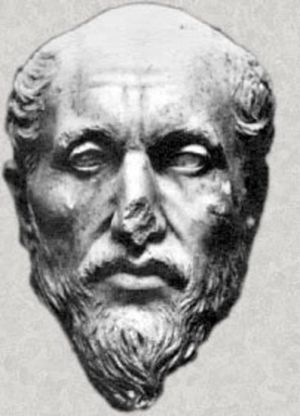Philo Judaeus

Philo Judaeus
Philo of Alexandria, also called Philo Judaeus, was a Hellenistic Jewish philosopher who lived in Alexandria, in the Roman province of Egypt. Philo used philosophical allegory to attempt to fuse and harmonize Greek philosophy with Jewish philosophy.
Some scholars hold that his concept of the Logos as God's creative principle influenced early Christology. Other scholars, however, deny direct influence but say both Philo and Early Christianity borrow from a common source.
We find a brief reference to Philo by the 1st-century Jewish historian Josephus. In Antiquities of the Jews, Josephus tells of Philo's selection by the Alexandrian Jewish community as their principal representative before the Roman emperor Gaius Caligula.
He says that Philo agreed to represent the Alexandrian Jews in regard to civil disorder that had developed between the Jews and the Greeks in Alexandria, Egypt. Josephus also tells us that Philo was skilled in philosophy, and that he was brother to an official called Alexander the alabarch.
- "There was now a tumult arisen at Alexandria, between the Jewish inhabitants and the Greeks; and three ambassadors were chosen out of each party that were at variance, who came to Gaius. Now one of these ambassadors from the people of Alexandria was Apion, (29) who uttered many blasphemies against the Jews; and, among other things that he said, he charged them with neglecting the honors that belonged to Caesar; for that while all who were subject to the Roman empire built altars and temples to Gaius, and in other regards universally received him as they received the gods, these Jews alone thought it a dishonorable thing for them to erect statues in honor of him, as well as to swear by his name. Many of these severe things were said by Apion, by which he hoped to provoke Gaius to anger at the Jews, as he was likely to be. But Philo, the principal of the Jewish embassage, a man eminent on all accounts, brother to Alexander the Alabarch, (30) and one not unskillful in philosophy, was ready to betake himself to make his defense against those accusations; but Gaius prohibited him, and bid him begone; he was also in such a rage, that it openly appeared he was about to do them some very great mischief. So Philo being thus affronted, went out, and said to those Jews who were about him, that they should be of good courage, since Gaius's words indeed showed anger at them, but in reality had already set God against himself." Antiquities of the Jews, xviii.8, § 1, Whiston's translation
His ancestors and family had social ties and connections to the priesthood in Judea, the Hasmonean Dynasty, the Herodian Dynasty and the Julio-Claudian dynasty in Rome. Philo visited the Temple in Jerusalem at least once in his lifetime.
Philo would have been a contemporary to Jesus and his Apostles. Philo along with his brothers received a thorough education. They were educated in the Hellenistic culture of Alexandria and Roman culture, to a degree in Ancient Egyptian culture and particularly in the traditions of Judaism, in the study of Jewish traditional literature and in Greek philosophy.
Allegory |
Metaphor |
Sophistry |
Strong delusion |
Golden calf |
Red Heifer |
The Allegories of the Sacred Laws by Philo Judaeus |
Priests |
Altars |
Clay and Stone |
Stones |
Stoning |
Sabbath |
Canaan
Breeches |
Cloths of service |
Wedding garment |
Fringes |
Calendars |
One purse |
Fathers |
Peaceful invasion of Canaan |
Trees |
other books at
http://thriceholy.net/furtherf.html